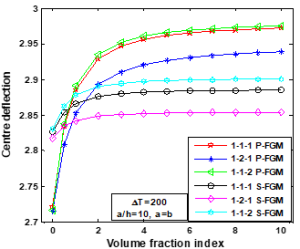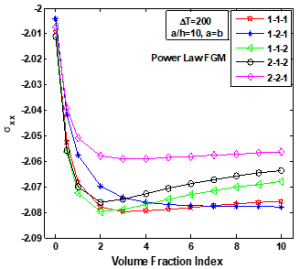- India’s semiconductor ambitions: Bridging the gap with the US May 29, 2025
- SRM-AP Partners with Elevium to Offer Industry-Aligned Courses May 28, 2025
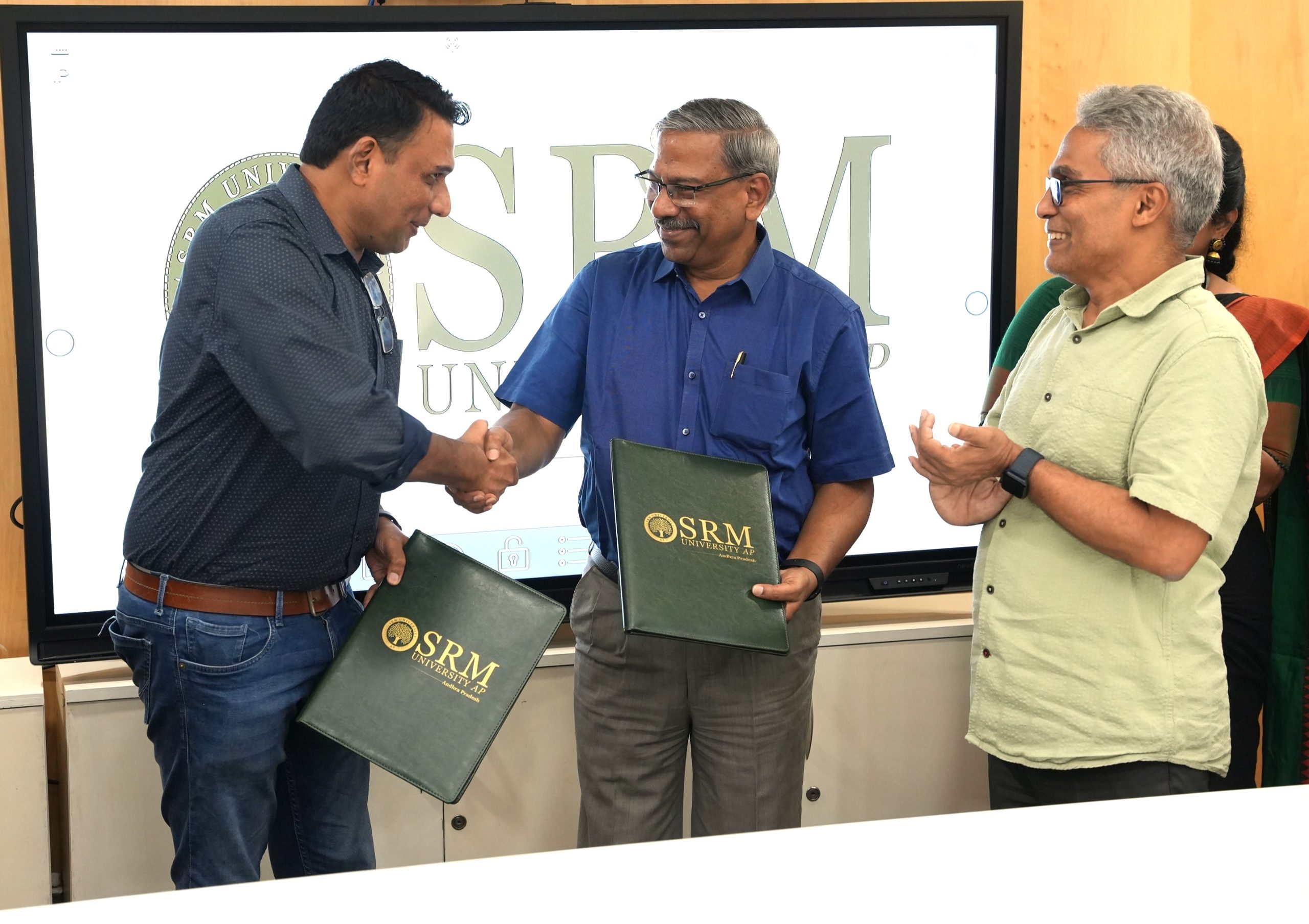 In a significant move to enhance skill-based learning through academia–industry collaboration, SRM University-AP, Amaravati, has entered into a strategic Memorandum of Agreement (MoA) with Elevium a division of Nanochip Skills Pvt. Ltd, a leading Bengaluru-based industry partner, to deliver cutting-edge, industry-aligned courses to students of the Department of Electronics and Communication Engineering (ECE).
In a significant move to enhance skill-based learning through academia–industry collaboration, SRM University-AP, Amaravati, has entered into a strategic Memorandum of Agreement (MoA) with Elevium a division of Nanochip Skills Pvt. Ltd, a leading Bengaluru-based industry partner, to deliver cutting-edge, industry-aligned courses to students of the Department of Electronics and Communication Engineering (ECE).This partnership bridges the gap between theoretical education and real-world industry requirements, particularly for ECE students. As part of the MoA, undergraduate ECE students from the 3rd to 7th semesters will have the opportunity to enroll in specialised, industry-aligned courses in VLSI, Embedded Systems, and Edge AI key domains shaping the future of the electronics sector.
Key Highlights of the Agreement:
Structured Course Delivery: One industry-aligned course per semester, each comprising 60 hours – delivered through a hybrid model of 40% offline and 60% online learning.
Enrollment Strategy: Designed for a minimum batch size of 120 students, with optional enrollment extended to students from other departments based on institutional discretion.Elevium will provide expert faculty from the industry, handle curriculum delivery, conduct assessments, and participate in curriculum review through Board of Studies meetings. SRM University-AP will facilitate access to classrooms, labs, and administrative support to integrate these courses seamlessly into the academic structure.
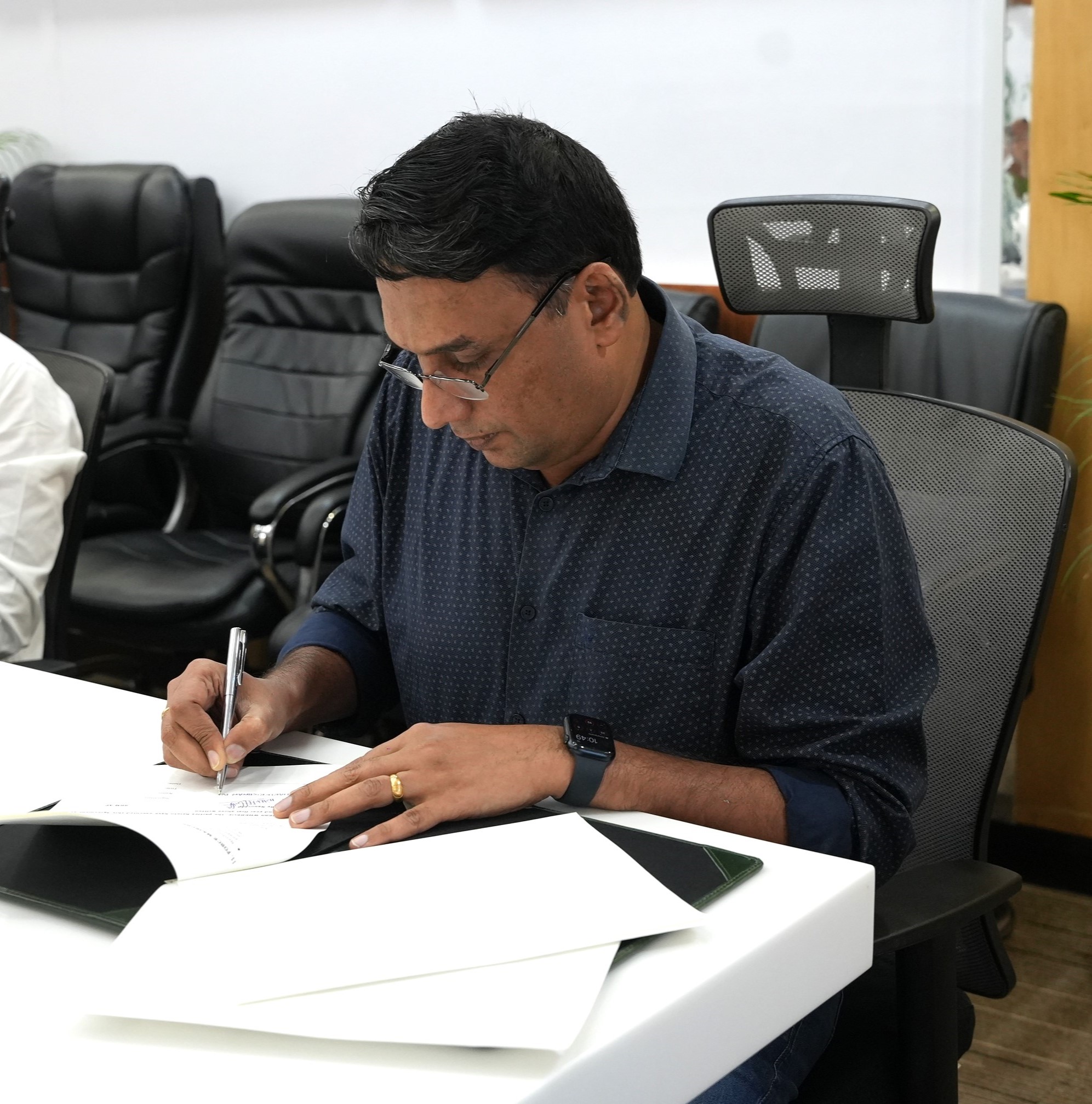
Student Evaluation and Curriculum Design:
Assessment methods and syllabus structures will be collaboratively developed and aligned with SRM-AP’s academic standards. The courses will include continuous evaluations and feedback mechanisms, with grading support from Elevium.
Placement and Career Support:
As part of its commitment, Elevium will extend comprehensive placement support including career counseling, guest lectures by industry experts, internship facilitation, and project guidance to enhance students’ employability.The primary goal of the MoA is to empower undergraduate students with hands-on learning aligned with current industrial practices and to facilitate their transition from classroom to the corporate world through structured and practice-driven academic modules.
The agreement was formally signed in the presence of esteemed dignitaries from both organisations, including Hari Krishnan Puravankara, CEO of Nanochip Group of Companies, Dr Manoranjan Kumar, Manager of university Programs at Nanochip Group of Companies, Dr Prem Kumar, Registrar, Prof. C V Tommy, Dean of SEAS, and other faculty members from the ECE department.
This collaboration exemplifies SRM-AP’s commitment to transforming education by integrating academic knowledge with industrial applications. Thus, students are empowered with real-world competencies that are crucial for tomorrow’s technology leaders.
Continue reading → - Dr Sukanya Samanta May 23, 2025
- The ‘Unholy’ Trinity: Repression of the Working- Class in Late-Colonial Bengal May 21, 2025
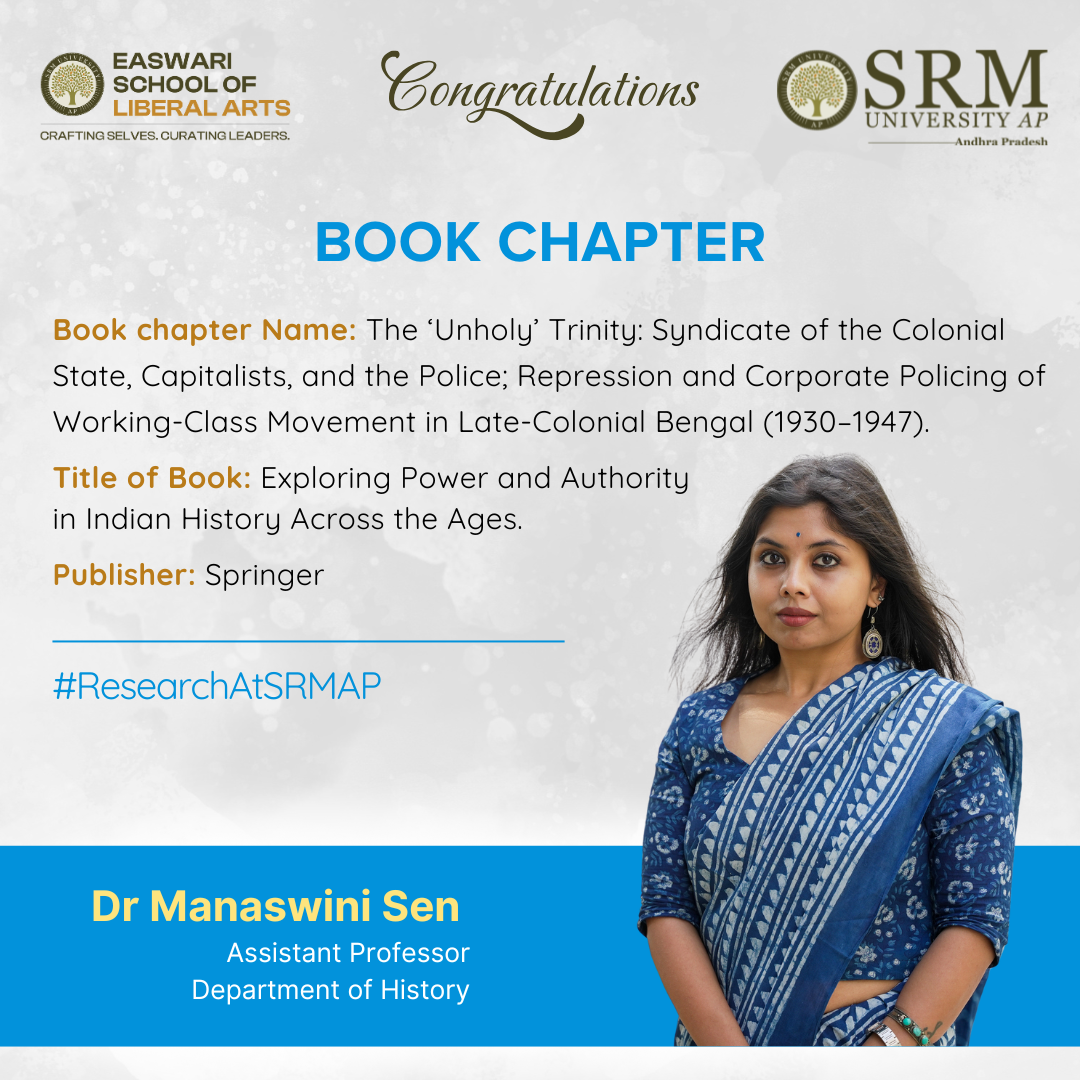 Dr Manaswini Sen, Assistant Professor in the Department of History at SRM University – AP, Amaravati in her chapter titled “The ‘Unholy’ Trinity: Syndicate of the Colonial State, Capitalists, and the Police; Repression and Corporate Policing of Working-Class Movement in Late-Colonial Bengal (1930–1947)”, published in Exploring Power and Authority in Indian History Across the Ages (Springer), investigates how the colonial state, capitalist interests, and the police referred to as the “unholy trinity”collaborated to repress working-class movements in late-colonial Calcutta between 1930 and 1947.
Dr Manaswini Sen, Assistant Professor in the Department of History at SRM University – AP, Amaravati in her chapter titled “The ‘Unholy’ Trinity: Syndicate of the Colonial State, Capitalists, and the Police; Repression and Corporate Policing of Working-Class Movement in Late-Colonial Bengal (1930–1947)”, published in Exploring Power and Authority in Indian History Across the Ages (Springer), investigates how the colonial state, capitalist interests, and the police referred to as the “unholy trinity”collaborated to repress working-class movements in late-colonial Calcutta between 1930 and 1947.The study examines the complex interests of the capitalist class and the British imperial state in late colonial India, focusing on their collective oppression towards labor radicalisation. It examines the legal measures taken by the British imperial state to monitor working-class militarisation and the strategies employed by capitalists to disrupt strikes and deny workers’ claims.
The chapter also discusses the establishment of white or pro-state unions that used communalism to disrupt strikes and hinder revolutionary union movements in late colonial Calcutta. The chapter provides new perspectives on competition-collaboration theories, discusses the role of Indian capitalists, and explores the question of communalism in trade union politics in late colonial Bengal. It is relevant for those working in labour history, mass movement history, late colonial Calcutta, and urban history.
About the book :
Exploring Power and Authority in Indian History Across the Ages offers a nuanced exploration of power and authority in Indian history through a series of case studies spanning different regions and time periods. It examines the sociological, cultural, economic, and historical dimensions of power, critiques dominant ideologies, and highlights responses from marginalised groups. Providing insights into diverse political structures from ancient to modern times, this volume is a valuable resource for historians, scholars, and researchers of Indian and South Asian history.
Continue reading → - Analysing Thermo-mechanical Bending Behaviour of Sigmoid FGM Sandwich Plate May 21, 2025
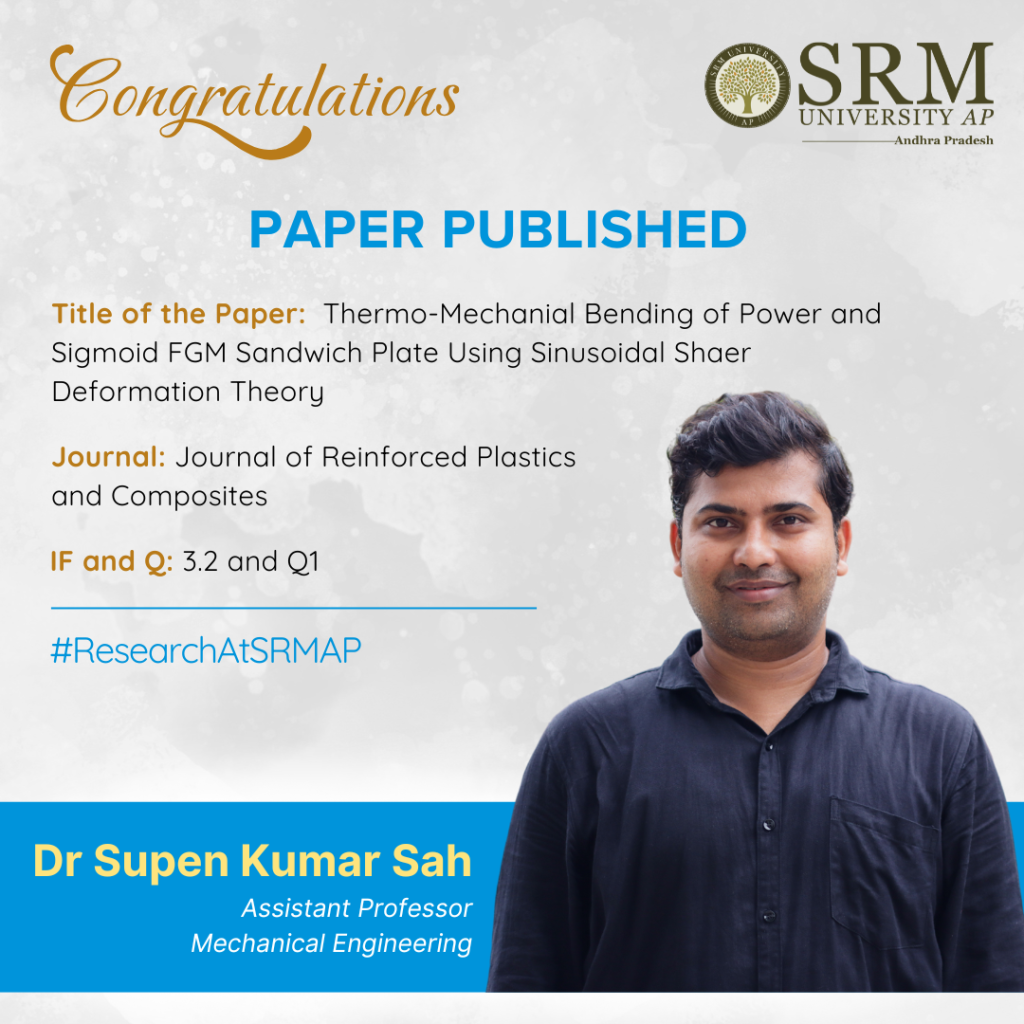
Dr Supen Kumar Sah, Assistant Professor at the Department of Mechanical Engineering presents his exclusive study on the thermo-mechanical bending behaviour of functionally graded material (FGM) sandwich plates using the Sinusoidal Shear Deformation Theory (SSDT) in his recent paper titled “Thermo-mechanical bending of power and sigmoid FGM sandwich plate using sinusoidal shear deformation theory”. The paper has been published in the Journal of Reinforced Plastics and Composites, having an impact factor of 3.2.
Abstract
This study examines the thermo-mechanical bending behaviour of functionally graded material (FGM) sandwich plates with temperature-dependent properties. FGMs, typically made from metal and ceramic, combine rigidity and high thermal resistance, and their properties are assumed to vary continuously in thickness. Using sigmoid and power law distributions, we analyse the smooth variation of properties and apply a one-dimensional heat conduction equation to determine temperature changes. The Sinusoidal Shear Deformation Theory (SSDT) is utilised to account for the sinusoidal distribution of shear stress while meeting traction-free boundary conditions. We derive the governing equations through Hamilton’s variational principle and Navier’s solution, resulting in closed-form solutions for center deflection, and normal and shear stresses of the plates. The analysis reveals that temperature-dependent properties and gradation indices significantly affect central deflection, normal stress, and shear stress. The SSDT results align well with existing shear deformation theory, confirming its accuracy.
Dr Sah collaborated with Dr Anup Ghosh from IIT Kharagpur on the research study. He aims to continue his research on FGMA and focus on the structural analysis of multidirectional Functionally Graded Material sandwich plates in the future.
Continue reading →


